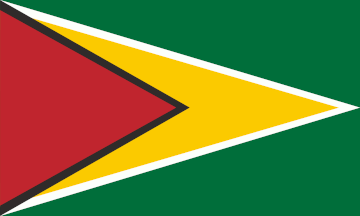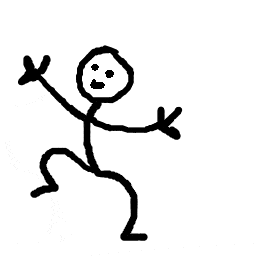GUYANA
What is the flag?
The
flag of Guyana, was designed with a golden arrowhead along its middle to signify
Guyana's journey into the future. The golden arrowhead, with narrow white and
black strips along its sides, was set on a green and red background with narrow
white and black strips along the sides of the arrowhead. The five colors were
also seen as symbolic to the country various assets: green for the agriculture
and forests; gold representing the country's mineral wealth; red for the zeal
of nation-building; black border, depicting the people's endurance; and white
symbolizing the natural water potential of the country.
Location and Geography.
Guyana is on the northeastern shoulder of South America, bounded on the
north by the Atlantic Ocean, on the east by Suriname, on the northwest by
Venezuela, and on the south and southwest by Brazil. The capital city is
Georgetown. In an area of 83,000 square miles (212,000 square kilometers),
there are three regions: the narrow coastal belt of rich alluvium; the
densely forested, hilly sand and clay belt; and the Rupununi grasslands
between the rain forests and the frontier with Brazil. Over 90 percent of
the population lives on the coastal belt, which is below sea level. The
Dutch, using African slaves in the eighteenth century, made this area
habitable. Every square mile of cultivated land has forty-nine miles of
drainage canals and ditches and sixteen miles of high-level waterways.
Demography.
The population was 758,619 in 1980. It had declined to 723,800 in 1991,
and an estimated 720,700 in 1996. In 1991, the population consisted of 49
percent Indians; 35 percent Africans; 7 percent mixed race peoples; and
6.8 percent Amerindians. Indians are of the following religions: Hindu, 65
percent; Muslim, 20 percent; and Christian, 15 percent. Massive migration
has led to the virtual disappearance of Chinese, mixed, Europeans, and
Portuguese.
Linguistic Affiliation.
The official language is English. No African languages survived slavery,
nor have those of the indentured laborers (Indians, Madeiran Portuguese,
and Chinese). Guyanese speak creole dialects of English with varying
ethnic lexical imprints. However, all dialects are mutually intelligible.
HISTORY OF GUYANA
- Set in the crown of South America, nestled on the
North-Eastern shoulder, defying the raging Atlantic Ocean, Guyana's many
waterways reflect the source of its name "The Land of Many Waters"
Guyana was discovered in 1498 by the Europeans, its history; therefore
stretches back a bit more than 500 years. Guyana's past is punctuated by
battles fought and won, possessions lost and regained as the Spanish,
French, Dutch and British wrangled for centuries to own this land.
- After the 1964 elections the PNC and the UF were able to form a ruling
coalition, and Burnham became prime minister. Full independence was
negotiated in 1966. In the elections of 1968 and 1973 the PNC won a
majority, and Burnham continued as prime minister. Guyana gained its Independence on the 26th of May 1966.
What are its traditions and customs?
Guyanese culture reflects the influence of
African, Indian, French,
Amerindian, Chinese, British, Dutch, Portuguese, Caribbean and American
culture, reflected in the various festivals celebrated throughout the
year. Most of the festivals have special significance to Guyana. Many
religions are practiced in Guyana, the predominant ones being
Christianity, Hinduism and Islam, Muslim.
Mashramani, sometimes referred to as
"Mash", is usually observed on the
23rd day of February - Guyana's Republic Day - to commemorate the "Birth
of the Republic". It is probably the most colorful of all the
festivals. There are spectacular costume competitions, float parades,
masquerade bands, and dancing in the streets to the accompaniment of
steel band music and calypso's. Masquerades frequent the streets
performing acrobatic dance routines, a vivid reminder of Guyana's
African heritage. Calypso competitions with their witty social
commentaries are another integral part of "Mash", and this culminates in
the coronation of a King or Queen for the particular year.
Phagwah is a Hindu religious holiday observed in March to celebrate the
triumph of good over evil. Hindus traditionally wear white on
Phagwah
day and indulge in the throwing upon each other of a harmless liquid
called abeer. Abeer is a red dye which symbolizes the blood of the
tyrannical King Kiranya who in Hindu lore was ordered burnt alive by his
son Prince Prahalad because of the suffering which his people endured
at the hands of his father. Powder, perfume, and water are also thrown
on family, friends and neighbours on this day by Hindus and non-Hindus
alike in what is an amusing, good-natured and joyful celebration.
HOW HISTORY & GEOGRAPHY SHAPED THE PEOPLE OF GUYANA'S MINDSET
Its is really hard to say how the people of Guyana think because their were so many different cultures and countries who have had their influence on the people and the country. Guyana is a third world country, For most of the early years upon its discovery it was fought for by the many different countries of Europe. Also having African slave along with indentured Indian servants made Guyana very diverse population wise. The culmination of these different cultures leads to a mindset of wanting to expand and grow. Everyone that I know personally who has roots in Guyana or was born and raised there seem to have a attitude that is, Work as hard as you possibly can and eventually you will make it. Their is a relentless will to most Guyanese people who are all for the most part, "Go-getter's". The people who are from the country when they come over to American see the country as it is proclaimed "the land of opportunity ". That is the mindset of Guyana and of Guyanese people, We work very hard to get where we want to be, Never settling for minimal effort, Always looking for a better brighter future.







